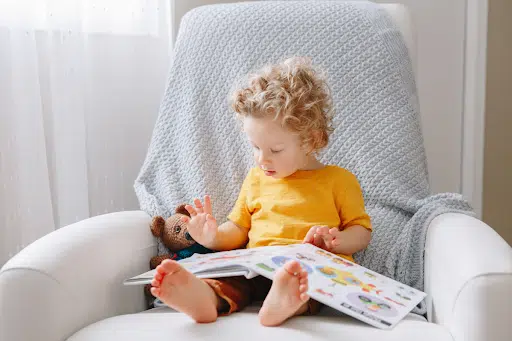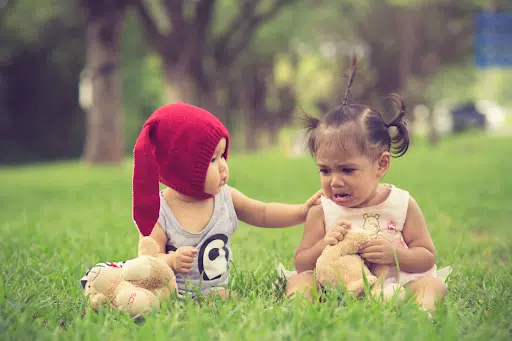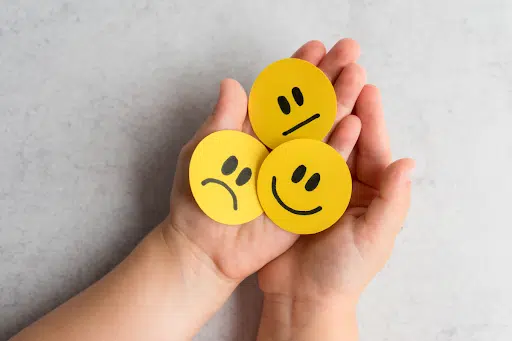
Great relationships are the foundation of a happy, fulfilling life, and at the core of building these relationships is empathy. Let’s explore how to nurture this vital ability in your child, shaping their capacity for understanding, connection, and heartfelt interactions.
What is empathy?
Empathy is the ability to understand and share the feelings of another person. It’s not just about recognising emotions; it’s about truly stepping into someone else’s shoes, feeling what they feel, and seeing the world from their perspective.
Empathy is a complex emotional skill that involves both identifying with another’s emotions and also responding to them with understanding and compassion. It’s a crucial human ability that allows us to connect deeply with others, fostering emotional bonds and a sense of shared humanity.
What Role Does Empathy Play in Nurturing Positive Relationships?
Empathy is like a special glue in relationships, especially for children. It helps them understand and connect with friends, family, and even teachers on a deeper level.
When children learn to empathise, they start to appreciate others’ feelings and perspectives. This leads to better conversations, stronger friendships, and kinder interactions.
Empathy teaches kids how to respond to others with care and understanding, making any place they go – from playgrounds to classrooms – a more nurturing and supportive space. It’s also a key skill in sorting out disagreements. By understanding how someone else feels, children can find kinder, more effective ways to resolve conflicts and get along with others.
Beyond Relationships: The Far-Reaching Benefits of Empathy
- Empathy extends its roots into every aspect of a child’s life. It’s linked to improved academic performance as empathetic children are better attuned to their teachers’ and peers’ cues, enhancing learning experiences.
- It plays a significant role in mental health, contributing to lower levels of stress and anxiety. Empathetic children can better navigate social situations, leading to stronger problem-solving skills and resilience.
- The neurological underpinnings of empathy are fascinating. When children practise empathy, they activate parts of the brain associated with emotional regulation and cognitive processing, enhancing decision-making and emotional intelligence.

Why it is important to nurture empathy from a young age
Nurturing empathy from a young age is crucial for several reasons:
- Empathy allows children to build and maintain strong, healthy relationships with peers, family, and educators. It’s essential for social harmony and understanding.
- Developing empathy contributes to a child’s overall emotional intelligence, including the ability to manage their own emotions and understand others’.
- Children who are empathetic are more likely to resolve conflicts constructively, without resorting to aggression or avoidance.
- Nurturing empathy in children lays the foundation for compassionate and understanding individuals.
- Empathetic children are often more socially adept; they can navigate various social situations effectively and are often more inclusive and accepting of differences.
- Empathy is linked to better classroom behaviour and an increased ability to cooperate with peers, contributing to a more conducive learning environment.
- Early development of empathy lays the groundwork for emotional wellbeing throughout life, including lower risks of antisocial behaviour and better mental health.
Empathy and relationships at Different Age Groups
By focusing on these age-specific strategies and acknowledging the challenges at each developmental stage, parents and educators can effectively guide children in becoming empathetic, compassionate individuals, leading to healthier and more positive relationships throughout their lives.
Toddlers (1-3 years)
At this age, toddlers start to recognise other children as companions. They begin learning the basics of empathy by observing and mimicking the actions and emotions of their peers.
Activities to Develop and Nurture Empathy:
- Simple Sharing Games: Introduce games that require taking turns, helping toddlers understand the concept of waiting and sharing.
- Emotion Cards: Use flashcards with different facial expressions to teach emotion recognition.
- Read Aloud: Choose books with simple stories that highlight emotions and friendships, explaining the feelings of each character.
- Pretend Play: Engage in role-playing activities with dolls or stuffed animals to demonstrate and practise caring behaviours.
- Music and Movement: Use songs about feelings to help them connect movement with emotions.
Possible Roadblocks: Toddlers often focus on themselves (egocentrism). They may find it challenging to understand that others have different thoughts and feelings.
Early Childhood (4-6 years)
Children at this age start forming stronger, more defined friendships. They can empathise and may begin to show concern for their friends’ feelings.
Activities to Develop and Nurture Empathy:
- Emotion-Based Storytelling: Use storytime to discuss how characters might feel and why, encouraging children to express empathy.
- Role-Playing: Simulate common social scenarios they might encounter, like someone being left out.
- Art Projects: Create artwork focused on expressing and discussing various emotions.
- Emotion Charades: Play games that involve guessing emotions, enhancing their ability to read and understand emotional cues.
- Helping Others: Organise simple activities, such as making get-well cards for sick classmates, to practise acts of kindness.
Possible Roadblocks: Children in this age group are developing emotional regulation skills. They might struggle to manage their feelings, which can impact their ability to empathise.
Middle Childhood (7-12 years)
As children grow, their social circles and interactions become more complex. Empathy is crucial for navigating these expanding relationships and understanding different viewpoints.
Activities to Develop and Nurture Empathy:
- Group Discussions: Encourage conversations about feelings and the impact of actions on others.
- Community Service Projects: Participate in group activities that focus on helping the community, fostering a sense of empathy and social responsibility.
- Journaling: Encourage writing about daily experiences and feelings to foster self-reflection and understanding of others.
- Problem-Solving Games: Introduce games that require teamwork, promoting understanding and cooperation.
- Cultural Exposure: Explore stories, films, and activities from various cultures to broaden their understanding and empathy for different perspectives.
Possible Roadblocks: The influence of peers can be strong at this age. Kids might face challenges in maintaining their sense of empathy under peer pressure.
Teens
For teens, empathy is key in forming deeper connections and navigating the complexities of teenage relationships, including romantic ones.
Activities to Develop and Nurture Empathy:
- Peer Mediation Training: Teach conflict resolution skills, important for resolving disputes empathetically.
- Volunteering: Encourage participation in broader community service projects, which can broaden their understanding and empathy for diverse life situations.
- Ethical Debates: Engage in discussions on real-world issues, encouraging them to understand and respect different viewpoints.
- Mentorship Programs: Participate in mentorship roles, either as mentors or mentees, to learn from different perspectives.
- Creative Expression: Use arts, writing, or music as outlets for exploring and expressing complex emotions and thoughts.
Possible roadblocks: Adolescents are shaping their identities and may struggle with empathy due to peer pressure, social expectations, and identity exploration.
The Real-World Impact of Raising Empathetic Kids
Nurturing empathy and raising kids who really understand and feel for others isn’t just good for them; it makes a big difference in the world around them. Let’s see how empathy helps in everyday life, at school, and even later on at work, and how it plays a huge part in stopping bullying.
Empathy at Work and School
- Being empathetic is key to getting along well with others, whether it’s in a family, with friends, at school, or later in a job.
- For kids at school, being able to understand how others feel means they can work better in teams, have a good relationship with teachers, and help make school a friendlier place.
- In the workplace, people who show empathy are often the ones everyone wants to work with. They’re good at understanding their colleagues and contribute to a nicer, more productive place to work.
Stopping Bullying with Empathy
- Empathy really matters when it comes to understanding and stopping bullying. If kids can put themselves in someone else’s shoes, they’re less likely to bully others and more likely to help if they see bullying happening.
- Teaching kids about empathy means they get why bullying is harmful and why it’s important not to do it. Schools that focus on empathy often see less bullying because students look out for each other more.
Making Society Better
- Nurturing empathy leads to kids who grow up understanding others’ feelings turn into adults who care about people and make their communities better places to live.
- Empathy also helps people understand those from different backgrounds and cultures. This is super important in today’s world, where being able to get along with all sorts of people is important.
Teaching kids to be empathetic can really change society, leading to a world where kindness and understanding are the norm.

Shichida’s Role in Fostering Empathetic Relationships
At Shichida, we’re big on helping kids not just learn their ABCs and 123s, but also on growing their hearts and minds.
Here’s how we help kids develop empathy:
- World Awareness with Flashcards: Our specially designed flashcards cover a range of topics, from different cultures to global places and beyond. These visuals broaden children’s horizons and cultivate a deep understanding of the world.
- Heartwarming Songs: Our selection of songs addresses various topics, including greetings, good manners, feelings and more. Music is a powerful tool for connecting with emotions and experiences.
- Patience and Politeness: Through every class interaction, we guide children in activities that encourage patience and politeness.
For older primary-aged kids:
- Mindful Listening: Children practise attentive listening, enhancing their ability to understand and connect with others’ emotions during verbal communication.
- Collaborative Science Investigation: Children work together on scientific hypotheses, fostering teamwork, communication, and consideration of each other’s ideas and feelings.
All of this happens in a caring environment where teachers, kids, and parents all connect. It’s this all-round approach that helps us shape little ones into understanding, empathetic people who are ready to build positive relationships wherever they go.
Book a trial class at a Shichida early learning centre today!


